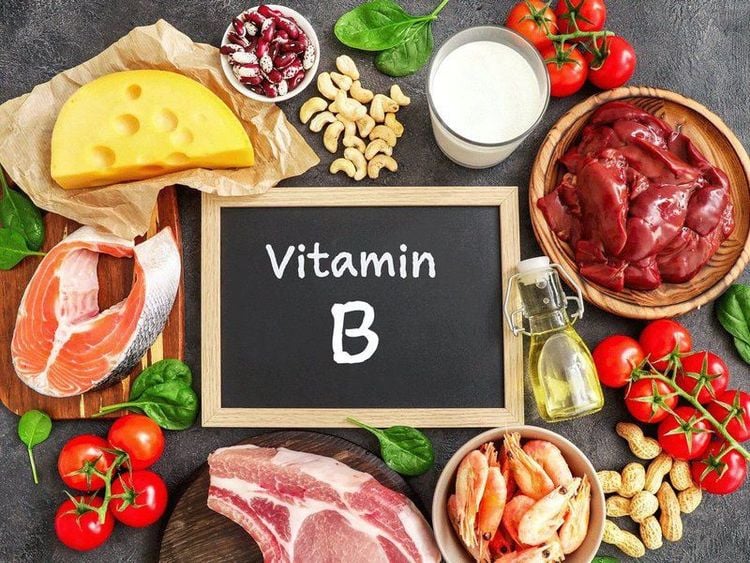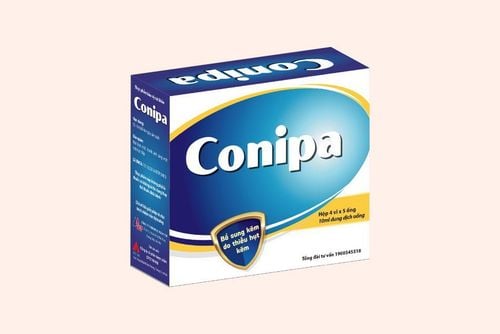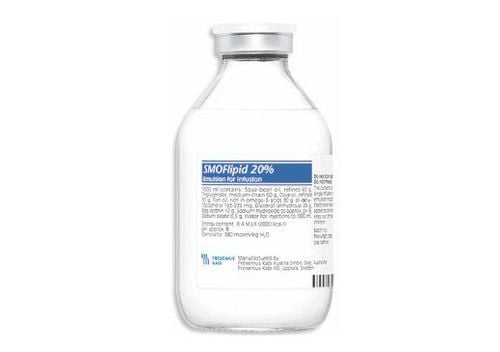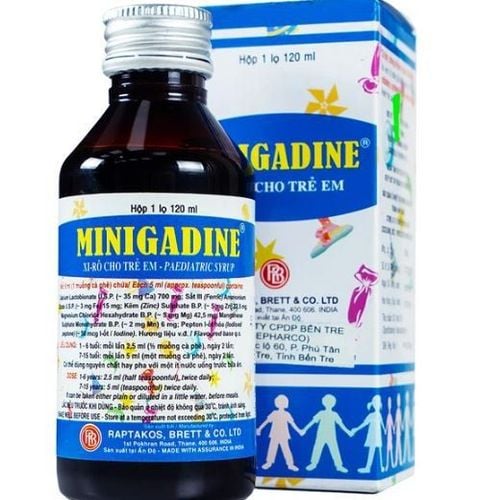This is an automatically translated article.
Deficiency of group B vitamins or vitamin B1 in children and anorexia children is closely related to the mother's diet during pregnancy or the duration of lactation. The consequences often affect children's growth, retardation of psychomotor development, and impaired immunity. There is also a risk that the child will be stunted and prone to infections. So how is vitamin B supplementation for anorexia children appropriate?1. Causes and effects of anorexia children
1.1. Causes of anorexia in children Some of the following common causes cause anorexia in children such as:Fear of being forced to eat: the child refuses to eat, parents are always afraid of their child being hungry, afraid of others She criticized her child for being skinny, so she accidentally tried to force her to eat enough food even though she didn't want to. Adults coax, flatter and then get angry because children refuse to eat, causing children to fear, eat while crying, try to avoid meals The menu is not rich, rarely changes, does not suit the taste of children Mistakes in the way of processing: stew a lot of vegetables and then puree for children to eat day after day. Feeding children only the juice of meat or vegetables without leaving the carcass or eating directly leads to a lack of nutrients. Giving solid foods to babies too early or too late, making the wrong formula too thick or too pale. Children are suffering from gastrointestinal diseases, respiratory diseases, weak bodies, fatigue that make them not want to eat. Physiological anorexia children follow each stage when they focus on learning the skills of rolling, sitting, crawling, standing, walking... After these stages pass, the baby will eat and drink normally again. But if the baby is anorexic for many weeks in a row, mothers need to take remedial measures. Children with anorexia due to taking drugs: drugs, especially antibiotics, cause intestinal dysbacteriosis, change the fermentation process of food, and unbalance the intestinal microflora leading to anorexia in children. Because right from birth, children have anorexia, just want to sleep, like to play without asking to eat. This phenomenon is called congenital anorexia. Because adults give children snacks: not only parents, but also children's relatives indulge the children's wishes but let children snack too many types of fast food or snacks, candy, chips, hot dogs. .. These foods themselves contain many additives and fats that make children full and cannot eat more. Long-term use of these fast foods will affect the intestines of children, increasing the risk of gastrointestinal diseases. Anorexia in children, if prolonged and often occurs, can cause children to face a number of problems such as:
Malnutrition Arrhythmia: Too fast or too slow Low blood pressure Number of red blood cells in the body low body weight (accounts for one-third of children with anorexia) Bowel movements are severely affected when children are not eating properly. Anorexia can be caused by drinking too much or too little liquid, both of which are extremely severe. harmful periods and lead to electrolyte abnormalities or kidney stones, respectively. Bone density decreases with long-term anorexia, and children have a higher risk of fracture than their peers.

Trẻ biếng ăn lâu ngày có thể bị suy dinh dưỡng, mật độ xương giảm
2. The role of vitamin B in anorexic children
B vitamins are a group of water-soluble vitamins that are considered “essential,” which means we must get them from our diets because our bodies cannot make them on their own. The B vitamins that together make up the “vitamin B complex” include:Vitamin B1 (thiamine) Vitamin B2 (riboflavin) Vitamin B3 (niacin) Vitamin B5 (pantothenic acid) Vitamin B6 Vitamin B7 (biotin) Vitamin B12 Folate (Vitamin B12) B9 or folic acid if synthetic) Summary B vitamins have similar roles and chemical properties, although each has distinct functions. Children's bodies use B vitamins throughout the day so we must replenish our regular supply with supplements or multivitamins, or simply eat foods rich in B vitamins.
3. The role of each type of vitamin B with anorexia children
Vitamin B1 (thiamine)Helps nourish nerves and help children gain healthy muscle mass. Break down carbohydrates into energy. Vitamin B2 (riboflavin)
Promotes the production of red blood cells in the child's body Helps with digestion and energy production for the child's body Activates the production of vitamin B6 and produces vitamin B3. Vitamin B3 (niacinamide or niacin)
Participates in the conversion of fats and carbohydrates into energy. Contributes to the maintenance of the normal functioning of the nervous system and digestive system in children. Helps children get healthy skin Vitamin B5 (pantothenic acid)
Children need it to metabolize fats and carbohydrates. Helps in the production of red blood cells and adrenal hormones in children. Vitamin B6 (pyridoxine)
Plays an equally important role in promoting brain development in children. Releases brain chemicals like serotonin, which regulates mood, and norepinephrine, which helps deal with stress. Supports the maintenance of the normal functioning of the nervous system and keeps the child's immune system healthy. Vitamin B7 (biotin)
Acts as a catalyst for the metabolism of cholesterol, some amino acids and fatty acids in children. Promotes healthy skin, hair and nails in children. Vitamin B9 (folic acid)
Plays an important role in the formation of red blood cells in children. Promotes healthy cell growth and DNA production. Vitamin B12 (cyanocobalamin)
Actively contributes to the creation of red blood cells in children. Supports the healthy maintenance of the child's nervous system and brain.

Bổ sung vitamin nhóm B giúp trẻ cải thiện nhiều vấn đề sức khỏe, bao gồm cả biếng ăn
3. How to supplement vitamin B for children with anorexia
Anorexic children of all ages need to receive the recommended daily essentials through a nutritious and balanced diet.3.1. Recommended dose For children under 4 years
Folic acid: 100/200 mcg daily Thiamine: 0.5/0.7 mg daily Niacin: 8/9 mg daily Riboflavin: 0.6/0.8 mg daily day Pantothenic acid: 3/5 mg daily Biotin: 50/150 mcg daily Pyridoxine: 0.1/0.5 mg daily Vitamin B12: 2/3 mcg daily For children over 4 years
Pantothenic acid: 10 mg daily Thiamine: 1.5 mg daily Niacin: 20 mg daily Riboflavin: 1.7 mg daily Pyridoxine: 2 mg daily Folic acid: 400 mcg daily Biotin: 300 mcg daily Vitamin B12: 6 mcg daily day 3.2. Supplementing vitamin B through the diet for anorexia children The easiest way to supplement B vitamins for babies and for babies with anorexia is through the diet. Here are the top 12 foods that contain vitamin B:
Organ liver or kidney Meat from herbivores like cows, sheep Wild caught fish, like salmon, mackerel, halibut, sardines, and more. Free-range chicken or duck eggs Field chickens and turkeys Fresh milk Dairy products, such as yogurt, cheese and kefir Green leafy vegetables Nuts, such as sunflower seeds, macadamia nuts, etc. Sea vegetables, such as spirulina Beans, legumes and peas Nutritional yeast Many whole foods are excellent sources of B vitamins - such as vegetables, meat, eggs, fish, beans and 100 products % from whole grains . Instead of consuming processed foods that are high in B vitamins, such as breads and breakfast cereals, it is better to get the necessary B vitamins from foods. Today, the U.S. Food and Drug Administration requires certain B vitamins to be added to most breads, flours, cornmeal, pasta, rice, and other grain products. , however, eating fortified foods is not necessary (or in some cases even beneficial) if you are feeding your child a well-balanced diet.
In case, the recommended dose of vitamin B is not met through the daily diet, the child needs to be supplemented with the necessary micronutrients: Zinc, selenium, chromium, vitamins B1 and B6, Ginger, extract extract acerola (vitamin C),... to improve taste, eat well, achieve the right height and weight, and exceed the standard, have a good immune system, enhance resistance to less sickness and less frequent illnesses digestive problems.
However, it is important to consult your doctor before using any vitamin supplement for proper dosage. It is best to take vitamin supplements for children in the form of drops rather than tablets for better absorption.
Please regularly visit Vinmec.com website and update useful information to take care of your baby and family.













